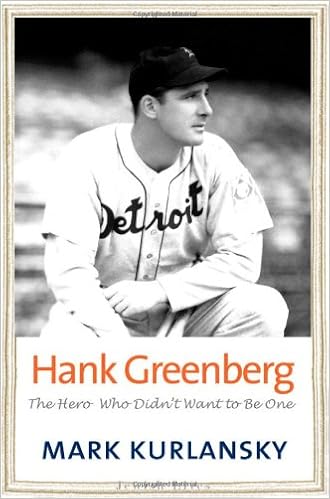
Hank Greenberg the son of immigrant Jewish parents grew up and played Major League Baseball during what was perhaps the time of the worst American anti-Semitism. Though his parents were Orthodox Jews, Hank was not a religious man. In the 1930's he went on to become the biggest of stars as a Detroit Tiger... coincidentally in the backyard of one of America's worst anti-Semites... and a pal of Hitler's... Henry Ford... he always said he wanted to be judged as a ballplayer and not as a "JEWISH BALLPLAYER". Whether he wanted to be or not... he was a hero to an American nation of Jews, both young and old. His parents were emblematic of the typical mindset of Jewish parents who originally thought playing baseball was an embarrassment, as compared to striving to get an education as a doctor, lawyer, or other skilled profession. But when Hank became a legend in Detroit, for among other things coming close to the infamous Babe Ruth's single season homerun record of sixty, when he hit fifty-eight in 1938... even his parents became proud of him, not only as an individual ballplayer... but as proof of what a Jewish person could accomplish in America. So whether Hank wanted to or not... he was a hero to Jewish people throughout the land.
The author does a good job of highlighting Hank's absolute modesty... when along with bashing balls out the park in magnificent quantities... he also became the highest paid active player in baseball... and to that period of time... the second highest paid in history behind the one and only Babe Ruth. It is also emphasized how hard working Greenberg was in his pursuit of his baseball dreams. Additionally, it's also made clear that he faced more prejudicial hate of any player before Jackie Robinson. And like Robinson in years to come he had his own version... in most cases... of turning the other cheek.
"HE NEVER USED ANTI-SEMITISM AS AN EXCUSE BECAUSE HE UNDERSTOOD THAT TO DO SO WOULD DIMINISH HIM, THAT THE PEOPLE WHO HATED HIM WANTED TO MAKE HIM SMALL, THAT IF HE COULD JUST KEEP HIS COMPOSURE, THEY WOULD BE THE ONES TO SHRINK. THAT IS AN INSPIRING IDEA, AN EXAMPLE OF HOW TO DEFEAT BIGOTRY, AND IT IS WHY HANK GREENBERG, ALL SIX FOOT FOUR OF HIM, WAS A GIANT."
Though that was his mantra... there were a number of times that Hank took matters into his own hands. Whether with teammates he physically confronted in the clubhouse... or opponents on the field. Coincidentally, his last year in baseball, with the National League Pittsburgh Pirates, was in 1947 the year Jackie Robinson broke the color barrier. The kindness that Hank Greenberg the ballplayer and human being showed to Jackie Robinson... was remembered by Jackie for the rest of his life. When Hank broke into baseball the veterans treated the rookies like they didn't exist... let alone a Jewish rookie. Hank never forgot that, and always treated young teammates with respect and worked with them to help them improve their game. One such young ballplayer was seven-time-National-League-homerun-king Ralph Kiner, who said Greenberg was the most influential person in his life... and on September 4, 1986 when Greenberg died, Kiner said "IT WAS THE WORST DAY OF MY LIFE."
Since this is a relatively short book, one-hundred-forty-eight-small-pages, not counting bibliography and index... the author does not... and cannot... go into great season by season detail as most sports books do. Additionally, due to its brevity, other portions of his life are also shortchanged detail wise. But what this extremely talented writer does make clear in the space given... is the conundrum... that the inner soul of Hank Greenberg was until the day he died. Hank, a highly intelligent... and at times volatile individual... didn't want to have to carry the weight of the pride and hopes of the Jewish people when he played. And yet at the end... (and to me the last ten to fifteen pages are the best of the book) he couldn't fully comprehend why he had changed... but... now he did want to be remembered as a great Jewish ballplayer. "I REALIZE NOW, MORE THAN I USED TO, HOW IMPORTANT A PART I PLAYED IN THE LIVES OF A GENERATION OF JEWISH KIDS WHO GREW UP IN THE THIRTIES."
No comments:
Post a Comment